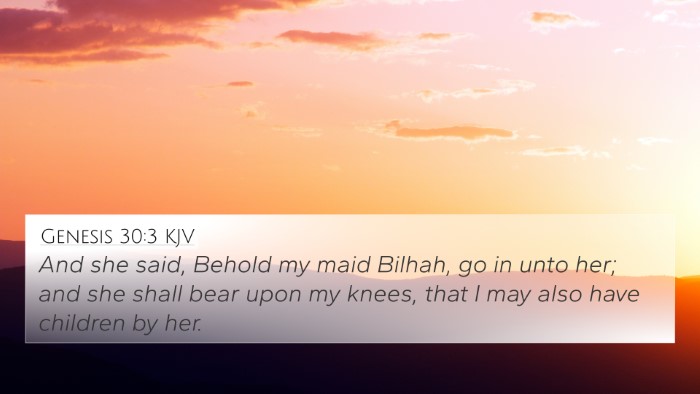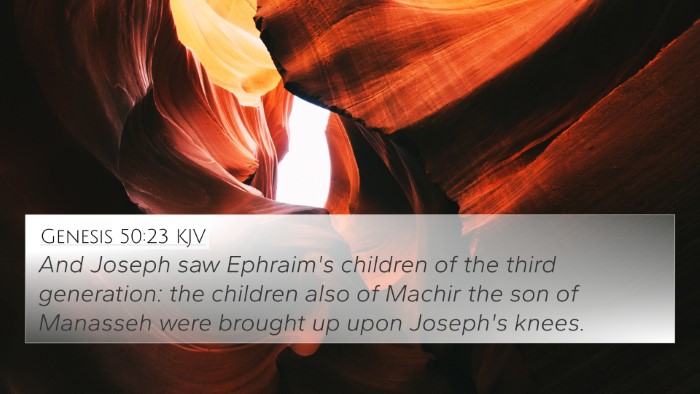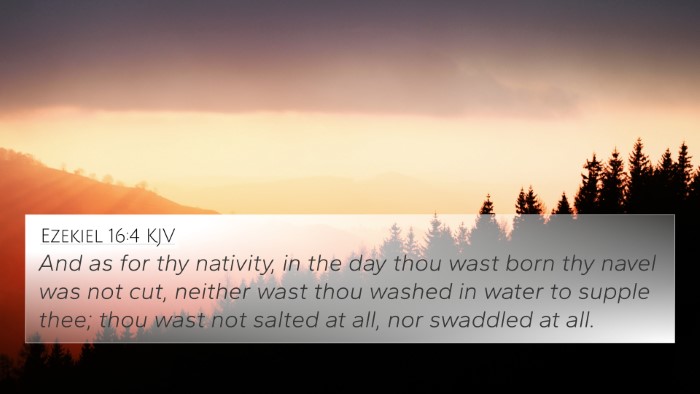Old Testament
Genesis Exodus Leviticus Numbers Deuteronomy Joshua Judges Ruth 1 Samuel 2 Samuel 1 Kings 2 Kings 1 Chronicles 2 Chronicles Ezra Nehemiah Esther Job Psalms Proverbs Ecclesiastes Song of Solomon Isaiah Jeremiah Lamentations Ezekiel Daniel Hosea Joel Amos Obadiah Jonah Micah Nahum Habakkuk Zephaniah Haggai Zechariah MalachiJob 3:12 Similar Verses
Job 3:12 Cross References
Why did the knees prevent me? or why the breasts that I should suck?
Uncover the Rich Themes and Topics of This Bible Verse
Listed below are the Bible themes associated with Job 3:12. We invite you to explore each theme to gain deeper insights into the Scriptures.
Job 3:12 Cross Reference Verses
This section features a detailed cross-reference designed to enrich your understanding of the Scriptures. Below, you will find carefully selected verses that echo the themes and teachings related to Job 3:12 KJV. Click on any image to explore detailed analyses of related Bible verses and uncover deeper theological insights.

Genesis 30:3 (KJV) »
And she said, Behold my maid Bilhah, go in unto her; and she shall bear upon my knees, that I may also have children by her.

Isaiah 66:12 (KJV) »
For thus saith the LORD, Behold, I will extend peace to her like a river, and the glory of the Gentiles like a flowing stream: then shall ye suck, ye shall be borne upon her sides, and be dandled upon her knees.

Genesis 50:23 (KJV) »
And Joseph saw Ephraim's children of the third generation: the children also of Machir the son of Manasseh were brought up upon Joseph's knees.

Ezekiel 16:4 (KJV) »
And as for thy nativity, in the day thou wast born thy navel was not cut, neither wast thou washed in water to supple thee; thou wast not salted at all, nor swaddled at all.
Job 3:12 Verse Analysis and Similar Verses
Understanding Job 3:12
Job 3:12 presents a significant moment in the Book of Job, where Job reflects on the day of his birth and the struggles he faces since the calamities have befallen him. This verse reads: “Why did the knees receive me? Or why the breasts, that I should suck?” It explores profound themes of existence, suffering, and the wish for non-existence.
Verse Meaning and Summary
The inquiry made in this verse reveals Job's deep lamentation over his birth and existence. By questioning why he was born if his life was to be filled with suffering, Job is expressing a feeling of despair. This sentiment is common in moments of significant distress as seen throughout the Bible.
Insights from Public Domain Commentaries
-
Matthew Henry:
Henry emphasizes the tragedy of Job's condition and the depth of his mourning. He notes that Job wished he had been stillborn, highlighting the overwhelming nature of his sufferings. This sets the stage for why Job feels the weight of his circumstances so profoundly, illustrating a theme of hopelessness frequently found among the afflicted.
-
Albert Barnes:
Barnes points out that Job's lament is not merely about his physical suffering but also about the emotional and spiritual toll it has taken on him. He suggests that the question arises from Job's desire to understand the purpose of his suffering, revealing a deeper theological inquiry into the nature of God and human suffering.
-
Adam Clarke:
Clarke elaborates on the intricacies of Job's situation, interpreting the verse through the lens of existential despair. He notes that Job views his birth as a curse rather than a blessing, which reflects significant Biblical themes regarding life’s value, suffering, and the human condition itself.
Related Bible Cross-References
This verse connects with various other scriptures, illustrating the theme of suffering and inquiries about existence:
- Ecclesiastes 4:2-3 - Reflecting on the plight of the dead versus the living.
- Psalms 139:13-16 - Contemplation on being fearfully and wonderfully made, contrasting Job's lament.
- Jeremiah 20:14 - A curse on the day of birth, echoing Job’s sentiments.
- Lamentations 3:10-11 - Expressions of deep despair similar to Job's feelings.
- Romans 8:18 - The idea of present sufferings not being worth comparing with future glory.
- Job 10:18-19 - Job’s further expressions of wishing he had never been born.
- Philippians 1:21 - For to me, to live is Christ and to die is gain, offering a contrasting view of life and death.
- Matthew 26:39 - Jesus expresses sorrow unto death, paralleling feelings of desperation.
Thematic Connections
Job 3:12 is central to various themes, such as:
- The Value of Life: In moments of distress, one may question the worth of existence, as illustrated by Job.
- Searching for Meaning: Job’s lament reveals a universal desire to comprehend suffering.
- The Nature of Suffering: The verse connects deeply with Biblical discussions on why the righteous suffer.
- The Pain of Despair: Echoes throughout scripture, as many figures grapple with hopelessness.
Cross-Referencing Methodology
Utilizing tools for Bible cross-referencing such as a Bible concordance or a Bible cross-reference guide can enrich understanding of verses like Job 3:12. These tools allow the believer to discover connections between Bible verses and deepen their appreciation of scriptural themes.
Conclusion
Job 3:12 serves as a heartbreaking reflection on suffering, existence, and the human condition. By examining public domain commentaries, various insights emerge that underscore Job's profound despair and theological inquiries regarding life’s purpose. Furthermore, engaging in Bible verse cross-references enriches our understanding of this powerful moment in biblical literature.
Exploring Further
For those seeking to explore similar sentiments, consider how other scripture interacts with themes of despair and existence, and utilize cross-referencing Bible study methods to uncover deeper meanings behind difficulties in life.


